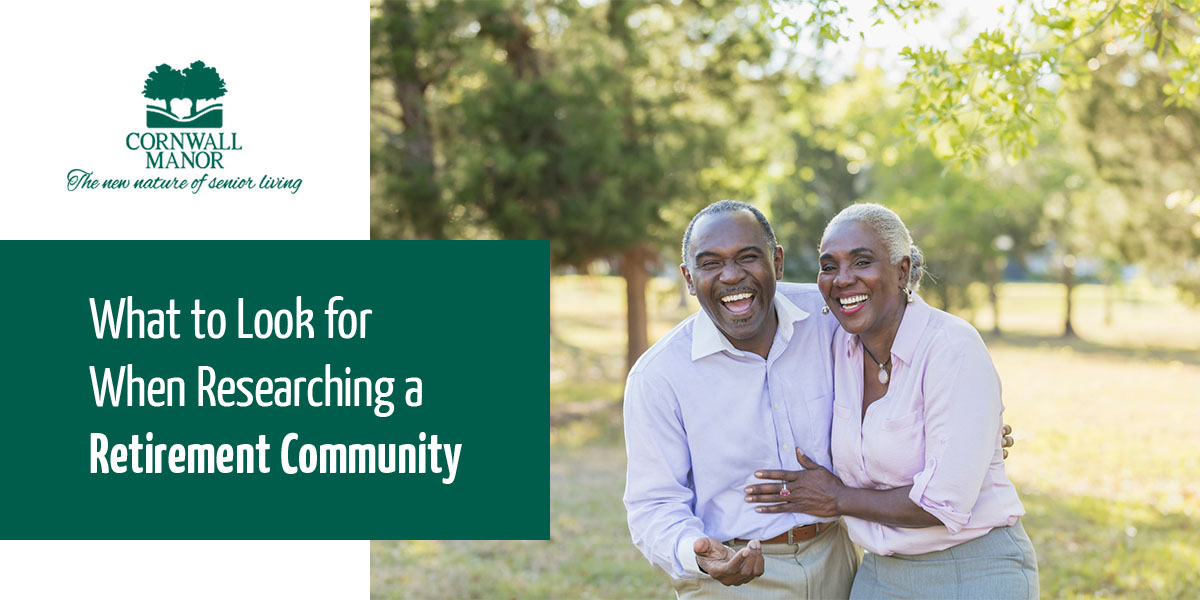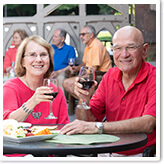What to Look for When Researching a Retirement Community
A retirement community is a residential community featuring apartments and houses designed for older adults coupled with amenities and services to support them throughout the various stages of their aging process. Every retirement community is different, and with so many options available from stand alone apartments or condo’s, continuing care communities, to 55+ communities and more, it can be hard to keep amenities, services and fees straight. Whether you are researching for yourself or a loved one, we encourage you to do your homework and visit several communities to determine what features are important to you.
Continuum of Care
A continuum of care community (CCRC) refers to a community that can provide levels of care over a period of time and can adapt to one’s changing needs. A CCRC like Cornwall Manor offers independent living, personal care, skilled nursing care, therapy services and an on-site Visiting Physicians Office on our campus. So, if your health needs change, you can remain at Cornwall Manor, as these services are all offered right on our campus.
Keep in mind that not every retirement community is a CCRC, so it’s valuable to look for the distinction. In fact, there are only 1,954 CCRCs in the United States. For a retirement community that is well-equipped to meet your health needs, a CCRC is an excellent choice.
Not-For-Profit vs. For-Profit
CCRC’s mostly consist of Not – For- Profit and For-Profit communities. Knowing the difference will help immensely. The differences between not-for-profit and for-profit CCRCs lies in what the facility does with its profits and how the community is run.
For-Profit
Unique features of for-profit CCRCs include:
- Generating profit: Just as other for-profit entities operate to provide services with the end goal of generating a profit , so do for-profit CCRCs.
- Maintaining a responsibility to investors: For-profit communities must answer to their investors and shareholders, who maintain expectations for a return on investment. Unfortunately, should a resident deplete their financial resources, they may be asked to relocate.
Did you know over 77% of retirement communities are for-profit?
Not-For-Profit
Not-for-profit CCRCs feature these qualities:
- Providing resident assistance: Not-for-profit communities offer mission-based care and have funds to help residents who may require financial assistance. No one is ever asked to leave if their financial resources are depleted. Many not-for-profit communities, such as Cornwall Manor, can provide assistance through an Endowment Fund to residents who have used all their resources. Not-for-profit CCRCs have staff and board members that place a high priority on resident satisfaction and quality care.
- Improve the community: A not-for-profit community invests its funds back into the operations and improvements of the community itself. Decisions are made without the input of investors, stockholders or outside stakeholders.
- Supporting the community: Both residents and staff of not-for-profit CCRCs have goals to improve their communities, whether through fundraising or volunteering. These CCRCs place value in social accountability. Communities may partner with local organizations, providing other not-for-profits like support groups with facilities to use.
At a not-for-profit community, such as Cornwall Manor, you can gain peace of mind knowing your needs inspire leaders’ decisions for the community. Located in Lebanon County, Cornwall Manor is able to maintain a beautiful , historic campus while focusing on being a good steward of the residents’ fees.
Financial Background and Stability of the Community
As you go about choosing a retirement community, be sure to consider the CCRCs’ financial situations. A community should provide an audited financial statement and a financial disclosure statement.
Be sure to inquire about aspects of CCRCs’ financial health, including financing debt. You should also ask about what the financial application process includes.
Lifestyle
A retirement community becomes your new home, so it should include features that are most important to your lifestyle. Consider these features of a senior living community.
1. Transportation
Many communities will offer transportation for their residents, like daily routes that give residents access to grocery stores, pharmacies, restaurants or shopping malls. They may also offer personalized transportation to take you to a medical appointment. Be sure to ask what transportation is available, when it operates and what the costs are when doing your research.
2. Dining
Here again, each community will differ. Questions to ask a potential retirement community include:
- What dining is available?
- Do they feature a meal plan with so many meals per month as part of your monthly fee, or is dining a la carte?
- Do they offer other services, like meal delivery, catering services or grocery delivery?
- Do independent living accommodations have a full kitchen to allow a prospective resident to do their own cooking or baking if they prefer?
Food is important! Be sure to check out the community’s menu and eat in their dining room as part of the research process.
3. Engagement
One of the many reasons older adults make the move to retirement communities is the access to social activities and engagement opportunities. When choosing your community, explore whether it offers engaging activities that represent your hobbies and interests. For example, if you love painting or drawing, you might look for a community with an art room or scheduled classes.
Other activities can include cultural outings, movie nights, community gardening and much more. Retirement is a chance to dedicate your time to the experiences that matter to you, and the community you choose should give you those experiences in abundance. Once you find an organization that offers ongoing engagement, you can continue with old hobbies and discover new ones.
4. Wellness
We’re all looking for ways to stay active, and wellness programs can make it easy to exercise every week. Look into on-site facilities to see if their wellness opportunities fit your preferences. Does the community have a dedicated staff person that coordinates or directs wellness activities? Many organizations have exercise rooms with weights, treadmills and other exercise equipment. Some may even have a swimming pool. Communities often host fitness classes like yoga, strength training and tai chi so you can make new friends while staying active.
5. Maintenance
If you’re planning on moving from a home that you’ve owned and maintained for some time, you probably love the idea of a maintenance-free lifestyle. When researching different communities, ask them about the maintenance requirements of their housing.
Many times, retirement communities offer complimentary maintenance whenever the need arises. Find out what sort of maintenance services communities provide and how to ask for assistance. The maintenance process should be fast and easy, so you can focus on enjoying yourself and getting involved with your favorite activities.
6. Pets
Many of us have dogs, cats or other pets. If you’re looking to take your animal companion to your retirement community, make sure it’s an option. Pet policies can vary widely. Some locations may have different types of housing where pets are only permitted in specific areas. Other communities may prohibit pets altogether. To ensure you can bring your pet with you, ask about a community’s pet policy.
Housing Options
The living space you require, such as an apartment or house, will play a significant role in whether a retirement community is right for you. The type of housing you need will depend on how much space you want.
Explore your housing options during your research to see what different communities offer. You may be able to narrow down your options based on what housing opportunities you find. If you’re looking for a house or large apartment, for example, make sure the community you’re researching offers these types of accommodations.
Choose Cornwall Manor as Your Retirement Community
Cornwall Manor is a not-for-profit continuing care retirement community that offers older adults high-quality housing and related services to enjoy their retirement for years in a beautiful, natural setting. With our many amenities, natural surroundings, historic buildings and proximity to cities like Hershey, Lancaster, Harrisburg and Reading, you can discover new hobbies, connect with others and enrich your everyday life.
With our fee-for-service model, you only pay for things you need, helping you create a completely custom retirement experience. At Cornwall Manor, we’re a welcoming community to all, and we’re here to create a fulfilling environment with housing, health care and community involvement. Discover the New Nature of Senior Living at Cornwall Manor. Get in touch with us today!








